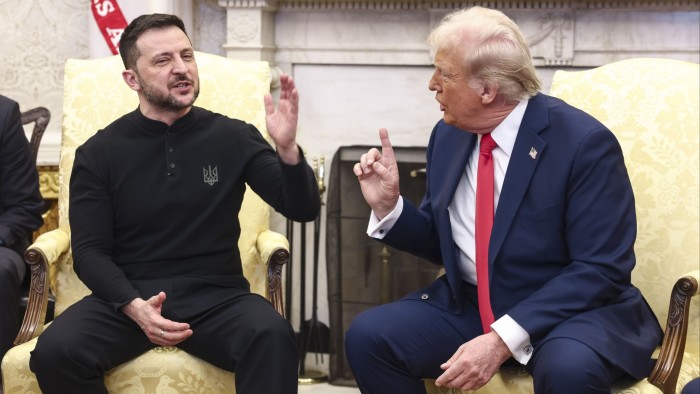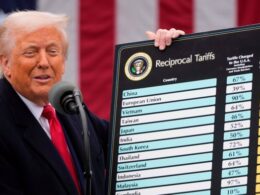Unlock the White House Watch newsletter for free
Your guide to what the 2024 US election means for Washington and the world
Near the start of Stalingrad, the first part of Vasily Grossman’s epic duology on Russia and totalitarianism during the second world war, two characters have a heated exchange. At the heart of their argument is a dispute over whether there can be more than one truth. “If we start playing at two truths, we’re in trouble,” one concludes tartly.
The Russian war correspondent turned author of the War and Peace of the Soviet era saw that as the last word on the matter. Not so Donald Trump, as we were reminded again this week.
“When you start a war, you gotta know you can win a war,” he said of Ukraine’s President Volodymyr Zelenskyy during his latest bout of extemporising on Russia’s invasion. “You don’t start a war against somebody that’s 20 times your size and then hope that people give you some missiles.”
So why does this falsehood matter, some may ask. Surely everyone knows Russia started the war. And anyway Trump and his entourage have long made clear their casual relationship with the truth. Just this week JD Vance, the vice-president, all but blamed the 2003 invasion of Iraq, in which he served, on Europe — for failing to protest enough about it.
“Frankly, if the Europeans had been a little more independent and a little more willing to stand up,” he told the news site Unherd, “then maybe we could have saved the entire world from the strategic disaster that was the American-led invasion of Iraq.”
Really? Try telling that to Dominique de Villepin, France’s foreign minister at the time. For those with hazy memories of the countdown to that disastrous war of America’s choice just go to YouTube and replay De Villepin’s impassioned speech to the UN.
Trump’s admirers, of course, say people should not be so pernickety. One confidant of the president and his inner circle tells me that Trump and his aides are all fans of pro wrestling and believe politics should play out publicly in the same spirit of mock combat.
Trump is a past master at pandering to the idea he should not always be taken too seriously. His delivery of the line “Did I say that?, with a cheeky raised eyebrow, is now something of a leitmotif. And there is of course a history of such “silly old me” self-deprecation when a president is caught out. Ronald Reagan comes to mind.
But there is a chasm of difference between the linguistic slipperiness of day-to-day politics and the twisting of history. There is a reason that writers from Aeschylus to Milton have grappled with disputes over the origins of conflicts. They understood — and explored — how valuable as a political weapon it can be to obscure the cause of a war.
The idea that truth is the “first casualty of war” has long been a cliché. Trump’s fiction about Ukraine reminds me of the Through the Looking-Glass line of the Bosnian Serbs besieging Sarajevo in the early 1990s. Even as they lobbed shells into the Bosnian capital from the surrounding hills, they would maintain they were the victims.
At least, however, their propaganda could be easily rebutted on the ground. Trump in contrast has the world’s most resonant megaphone. Every time he utters such lies, he sows more doubt in America about the history of its involvement in the war, and further conflates legitimate questions about Ukraine with Russian talking points.
The Maga line is that Zelenskyy’s government is desperate to keep the war going so they can stay in power. That is nonsense. Certainly, the government is flawed. Its recruitment for the armed forces, for example, has been calamitous. And no doubt it will emerge eventually that some of the military aid has gone astray. Yet as anyone who goes to Ukraine can see, the truth is that the people are exhausted and desperate for peace — but it has to be a just and secure peace, which will ensure Russia cannot take a breather and then invade again.
This is not, however, solely about decency and justice for Ukraine. It is also about America’s place in the world. Trust in it among its traditional allies is leaking away by the day. South-east Asian officials openly ask if it can ever be regained. Many European officials argue it has gone for the foreseeable future. Blatant untruths from the White House reinforce this sense.
In Stalingrad a would-be Communist party member argues in favour of focusing on the “truth of the future”— ie the utopian vision of the party — rather than dwelling on grim reality. That is the Trump way. Ignore the facts and focus on a fanciful or indeed a “great” future. Grossman rightly gives this short shrift. As one of his characters replies cuttingly to the idealist: “In war . . . there is only one truth.”
Source link









